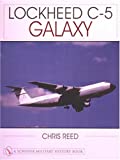| Country of Origin | USA. |
|---|---|
| Similar Aircraft | C-17A Globemaster III, C-141 Starlifter, Il-76 Candid, An-124 Condor. |
| Crew | Six. |
| Role | Heavy-transport (345 equipped troops), heavy-cargo (armored vehicles, weapons, helicopters). |
| Armament | Usually none. |
| Dimensions | Length: 247 ft, 10 in (75.54 m). Span: 222 ft, 8 in (67.88 m). |
C-5 Galaxy WEFT Description
| Wings | High-mounted, swept-back, and tapered with curved tips and negative slant. |
|---|---|
| Engine(s) | Four turbofans, suspended on pylons, and extending forward of the wings�’ leading edges. Round air intakes. |
| Fuselage | Large, cigar-shaped, and tapered to tail section. Slightly tapered, rounded nose. Stepped cockpit. Landing gear bulges at lower midsection. Upswept rear section. |
| Tail | Swept-back, tapered tail flats and high-mounted on a swept-back, tapered tail fin forming a T. |
Countries which Fly the C-5 Galaxy
USA.
C-5 Galaxy Manufacturer Web Site
Books on the C-5 Galaxy

Lockheed C-5 Galaxy
The C-5 Galaxy was designed in the mid-1960s to transport vast quantities of material to any part of the globe. The result was the largest aircraft in the world. However, it became a symbol for government excess and production was limited to just 81 machines. Initial operations struggled with frequent breakdowns and, in an extraordinary move, the gravely under-designed wing was replaced. Even more remarkable was the decision to reopen production after a decade for another 50 machines. Because of its incredible capacity and range, the C-5 Galaxy remains indispensable. The decision has been made to refit the aircraft for decades of more operation. This is the remarkable story of the Galaxy’s controversial birth, climb to eminence, and quarter century of service. This detailed story is told with hundreds of supporting illustrations, objectively exploring controversial subjects based on thorough research. Never before have the structural and subsystem problems experienced by the C-5 during its early years been explored so succinctly in a manner suitable for popular publication. This was possible because of the author’s background as an aeronautical engineer involved in aircraft development and flight test. The book also lays out the jet’s history and details of the currently-underway modernization program. Unique missions such as airdrop are shown in rare photographs and drawings, with hundreds of other illustrations appealing to modelers and historians.

Lockheed C-5 Galaxy
Still the largest U.S. military aircraft more than three decades after its first flight, the Lockheed C-5 Galaxy remains an integral part of Air Mobility Command into the 21st century. Lockheed C-5 Galaxy chronicles the development and service career of this behemoth of the airways, starting with the early 1960s requirement for a larger airlifter to supplement the C-141A, through Galaxy’s troubled early history to the type’s service during the Nickel Grass, Desert Shield, and other airlift operations. Several Galaxy counterparts, such as the Antonov An-124, are also depicted.
